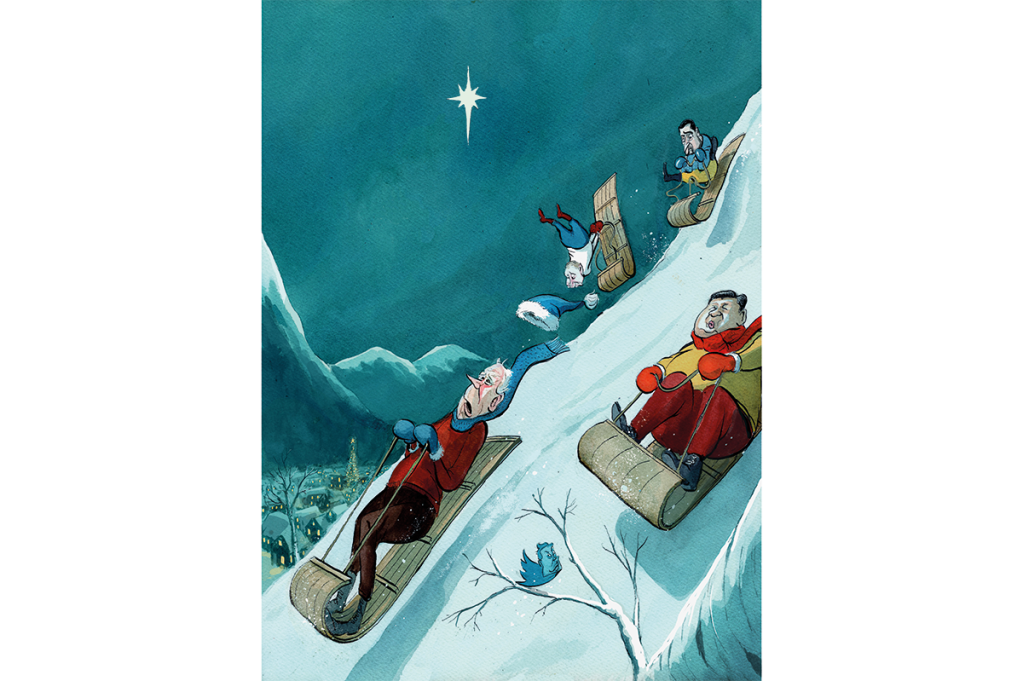Are we in a permanent state of crisis? The Britain-based lexicographers at the Collins Dictionary think so. Last month they chose “permacrisis” as their word of the year. Defining the neologism as “an extended period of instability and insecurity,” Collins explained that their selection “sums up quite succinctly how truly awful 2022 has been for so many people.”
It’s easy to see why the word has particular resonance for the Brits, now onto their third prime minister this year. But the sense that we are stuck in an endless cycle of crises is a global one. As 2022 draws to a close, the world faces a daunting set of overlapping disasters.
There’s Russia’s invasion of Ukraine, of course, the harsh on-the-ground reality of which is captured by Bernard-Henri Lévy in this month’s diary (p.9). There’s an increasingly aggressive China, thought by the US and other Western governments to be accelerating plans for an invasion of Taiwan. And there’s a daunting economic in-tray that former US treasury secretary Larry Summers recently called “the most complex, disparate and cross-cutting set of challenges that I can remember in the forty years that I have been paying attention to such things.” Far from giving way to the “roaring Twenties” that some predicted, the pandemic now looks more like the prelude to a volatile new normal.
After two plague years, we hoped to step out into sunny boom times. Instead 2022 gave us war in Europe, a new age of nuclear standoff, great power conflict and inflation. Cheap money is a thing of the past, as is the assumption of an increasingly frictionless, globalized world. Historians play an ominous parlor game, debating whether today more closely resembles the turbulent 1970s or the catastrophic 1930s. Amid these titanic changes, no one shows signs of being in control. To borrow a seasonal metaphor from this month’s cover, world leaders have lost control of their toboggans and are hurtling down the mountainside without much of a plan.
One of the challenges of the permacrisis is sorting understandable alarm from needless hyperventilating. There is no shortage of alarmism to distract from causes for genuine concern. In domestic politics, loud voices on the left and the right scream foul play over US democracy when voting has never been more secure or straightforward. The great freakout is exacerbated by the way many of us experience the turbulence, via apps optimized to provoke strong reactions. (Hence another neologism of this era of uncertainty: “doomscrolling.”) The medium isn’t always the message, but it’s hard to shake the feeling that social media’s dopamine-delivery systems have added to our sense of crisis. Ironically, Elon Musk’s acquisition of Twitter, which he says is an effort to build a better global town square, prompted exactly the kind of histrionics that the platform encourages. (On p.10, Ashley Rindsberg asks whether Musk will succeed — and meets some of the entrepreneurs building cutting-edge, decentralized alternatives.)
If one of the hazards of permacrisis is unwarranted outrage, another is an addiction to bad news that not only blinds you to the good, but induces a nihilistic hopelessness. We certainly aren’t living in the age of Aquarius. Far from it. 2022 was a hard year, but also a clarifying one. Among its more heartening reminders is of the enduring advantages of the West’s system of government.
Cast your mind back to the second half of 2021. It was taken as given that China’s response to the pandemic had outshone the West’s. It was also assumed that Vladimir Putin was the canny commander of a fearsome army. The question of whether Putin would actually invade Ukraine was debated; that he would be able do so and win quickly was not. Fast-forward twelve months and things look very different. Xi Jinping has constructed a biosurveillance state of dystopian omniscience and stuck to a disastrous “zero Covid” strategy that fills the rest of the world with dread, not envy, and undercuts predictions of China’s unstoppable rise. As for Putin and his army, they have undershot expectations against reassuringly stout Ukrainian resistance and a surprisingly united Western response. Whether it’s the technocrats touting the “China model” or the minority of conservatives who saw Putin as an anti-woke crusader, the last twelve months have not helped our hemisphere’s internal critics.
But the West’s relative resilience should not breed complacency. The permacrisis’s biggest lesson of all is that nothing is inevitable. If you’re not persuaded by the geopolitical examples, look at Big Tech: Musk has bought Twitter and thrown its censorious management overboard, while the Meta juggernaut has been cut down to size. Far from leading us on an unwelcome march into the metaverse, Mark Zuckerberg commands a company worth about a third of what it was at the start of the year. That undercuts confident assertions that our tech overlords held impregnable positions of dominance. The exception isn’t the volatility of the last few years but the assumption of predictability that dominated the previous few decades. What some call “permacrisis,” others might just call “history” — and our holiday from it is over. The rocky road ahead demands cool heads, humility and, of course, a trustworthy guide. Thanks for subscribing. Happy holidays!
This article was originally published in The Spectator’s December 2022 World edition.

























